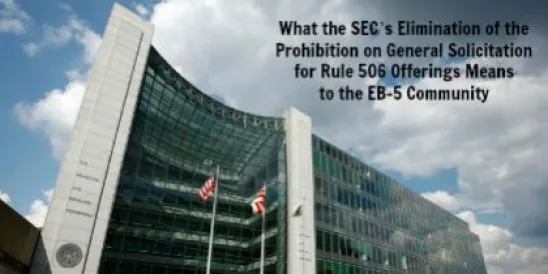On Wednesday June 30, 2010, members of the Securities and Exchange Commission (the “SEC”) voted unanimously to approve new Rule 206(4)-5 (the “Rule”) adopted under the Investment Advisers Act of 1940 (the “Advisers Act”). The Rule is aimed at curbing so-called pay-to-play abuses resulting from investment advisors making political contributions in order to influence persons involved in selecting investment advisors to manage public pension fund assets. The final text of the Rule was published in the Federal Register on July 14, 2010.
The Rule applies to any investment adviser that is registered (or required to be registered) with the SEC, or that is unregistered in reliance on the exemption available under Section 203(b)(3) of the Advisers Act (“Section 203(b)(3)”). The Rule does not, however, apply to most advisers that are registered with state securities authorities, or advisers that are unregistered in reliance on exemptions other than Section 203(b)(3).
Unregistered investment advisers should note that the Dodd-Frank Wall Street Reform and Consumer Protection Act (the “Dodd-Frank Act”), which was signed into law by President Obama on July 20, 2010, amends several exemptions from registration under the Advisers Act, including Section 203(b)(3) (eliminating the 203(b)(3) exemption that was in effect as of the adoption of the Rule). It is unclear what effect the Dodd-Frank Act will have with respect to the applicability of the Rule to unregistered investment advisers. Further SEC rulemaking will likely be necessary in the future to harmonize the Rule with the amendments set forth in the Dodd-Frank Act.
Rule 206(4)-5:
The Rule sets forth several restrictions on investment advisers that are meant to help minimize or eliminate manipulation of the market for advisory services provided to state and local governments.
First, the Rule makes it unlawful for an adviser to receive compensation for providing advisory services to a government entity for a two-year period after the adviser or any of its covered associates1 makes a political contribution2 to a public official of a government entity or candidate for such office who is or will be in a position to influence the award of advisory business. The Rule does not ban political contributions and does not limit the amount of any political contribution. Instead, it imposes a ban or “time out” on receiving compensation for conducting advisory business with a government client for two years after certain contributions are made. The Rule contains a de minimis exception that permits individuals to make aggregate contributions without triggering the two-year time out of up to $350 per election to an elected official or candidate for whom the individual is entitled to vote, and up to $150 per election to an elected official or candidate for whom the individual is not entitled to vote. This de minimis exception is available only for contributions by individual covered associates, not the investment adviser itself.
With limited exceptions, the Rule attributes to an adviser any contributions made by a covered associate (i) within six months of becoming a covered associate of the adviser in the case of any covered associate not performing any solicitation of clients on behalf of the adviser, or (ii) within two years of becoming a covered associate with respect to covered associates that solicit clients on behalf of the adviser, in each case whether or not such person was an employee of the adviser in such prior period. Thus, when an employee becomes a covered associate, the adviser must look back in time to that employee’s contributions to determine whether the time out applies to the adviser.
Second, the Rule prohibits advisers from paying third parties to solicit government entities for advisory business unless such third parties are regulated persons. The term “regulated persons” includes certain SEC registered broker-dealers and SEC registered investment advisers that are themselves subject to prohibitions against participating in pay-to-play practices and are subject to oversight by the SEC and, in the case of broker-dealers, a qualifying registered national securities association, such as FINRA3. Further, the SEC indicates in its adopting release to the Rule that to the extent an adviser will compensate any regulated person that is another investment adviser for soliciting government entities, such solicitor adviser will be a “supervised person” within the meaning of Rule 206(4)-7 under the Advisers Act, and as such the supervising investment adviser will be required to adopt policies and procedures reasonably designed to prevent a violation of the Rule by the adviser soliciting business on its behalf.
Third, the Rule makes it unlawful for an adviser itself or any of its covered associates to solicit any person or political action committee to make or for and adviser or any of its covered affiliates to coordinate: (i) contributions to an official of a government entity to which the investment adviser is seeking to provide investment advisory services, or (ii) payments to a political party of a state or locality where the investment adviser is providing or seeking to provide investment advisory services to a government entity. These restrictions are intended to prevent advisers from circumventing the Rule’s prohibition on direct contributions to certain elected officials by taking actions such as bundling a large number of small employee contributions to influence an election, or making contributions (or payments) indirectly through a state or local political party.
Fourth, the Rule specifies that an investment adviser to covered investment pools4 in which a government entity invests or is solicited to invest will be treated as though the adviser were providing or seeking to provide investment advisory services directly to the government entity. The term “covered investment pool” includes such unregistered pooled investment vehicles as hedge funds, private equity funds, venture capital funds and collective investment trusts.
Finally, the Rule includes a provision that makes it unlawful for an adviser or any of its covered associates to do anything indirectly which, if done directly, would result in a violation of the Rule.
Amendments to Rules 204-2 and 206(4)-3:
In addition to the adoption of the Rule, the SEC also adopted amendments to Rule 204-2 and 206(4)-3 under the Advisers Act. The amendments to Rule 204-2 impose recordkeeping requirements on registered investment advisers that have government clients, or that provide investment advisory services to a covered investment pool in which a government entity investor invests. Advisers that are subject to the Rule but exempt from SEC registration will not be subject to such recordkeeping requirements.
The amendments to Rule 204-2 require advisers to make and keep the following records: (i) the names, titles, and business and residence addresses of all covered associates of the investment adviser; (ii) all government entities to which the investment adviser provides or has provided investment advisory services, or which are or were investors in any covered investment pool to which the investment adviser provides or has provided investment advisory services, as applicable, in the past five years, but not prior to the effective date of the Rule; (iii) all direct or indirect contributions made by the investment adviser or any of its covered associates to an official of a government entity, or payments to a political party of a state or political subdivision thereof, or to a political action committee; and (iv) the name and business address of each regulated person to whom the investment adviser provides or agrees to provide, directly or indirectly, payment to solicit a government entity for investment advisory services on its behalf.
The SEC adopted a technical amendment to Rule 206(4)-3 (the “cash solicitation rule”) that alerts advisers and others that special prohibitions apply to solicitation activities involving government entity clients under the Rule.
Effective Dates:
The Rule and the amendments to rules 204-2 and 206(4)-3 are effective on September 13, 2010 and advisors must be in compliance therewith according to the following schedule:
- Except as set forth below, as of March 14, 2011, investment advisers subject to the Rule must be in compliance therewith.
- As of September 13, 2011, investment advisers may no longer use third parties to solicit government business except in compliance with the Rule.
- As of September 13, 2011, advisers to registered investment companies that are covered investment pools must comply with the Rule.
- As of March 14, 2011, advisers subject to rule 204-2 must comply with the recordkeeping requirements set forth therein. However, if such advisers advise registered investment companies that are covered investment pools, the recordkeeping requirements with respect to those registered investment companies need not be complied with until September 13, 2011.
1 A “covered associate” of an investment adviser is defined as: (i) any general partner, managing member or executive officer, or other individual with a similar status or function; (ii) any employee who solicits a government entity for the investment adviser and any person who supervises, directly or indirectly, such employee; and (iii) any political action committee controlled by the investment adviser or by any of its covered associates.
2 A “contribution” is defined to include a gift, subscription, loan, advance, deposit of money, or anything of value made for the purpose of influencing an election for a federal, state or local office, including any payments for debts incurred in such an election. It also includes transition or inaugural expenses incurred by a successful candidate for state or local office.
3 For a broker-dealer to be a “regulated person” under the Rule, the broker-dealer must be registered with the SEC and be a member of a registered national securities association that has a rule: (i) that prohibits members from engaging in distribution or solicitation activities if certain political contributions have been made; and (ii) that the SEC finds both to impose substantially equivalent or more stringent restrictions on broker-dealers than those set forth in the Rule.
4 Under the Rule, a “covered investment pool” includes: (i) any investment company registered under the Investment Company Act of 1940 that is an investment option of a plan or program of a government entity, or (ii) any company that would be an investment company under Section 3(a) of that Act but for the exclusion






 />i
/>i


